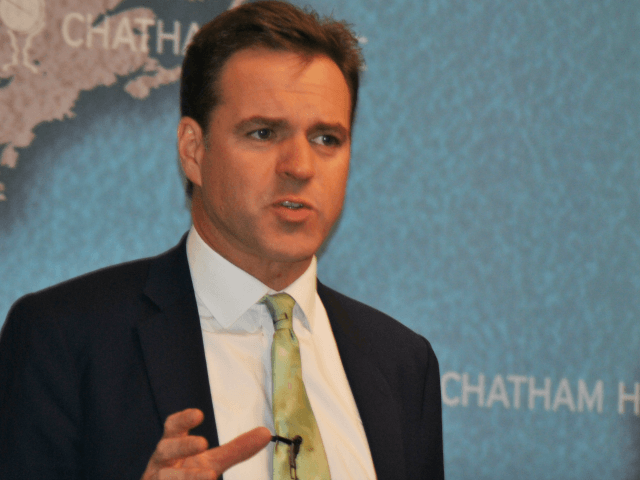Scottish author and ex-pat Niall Ferguson, who left Britain’s shores for the greener pastures of Harvard University, has implored his fellow ex-countrymen to stay in the European Union because if we leave, he says, we’ll only have to return to fix it later.
Mr. Ferguson, author of acclaimed books such as ‘Civilisation’ and ‘Empire‘, has written for the Sunday Times, in an appeal to those who think more should have been done in 1520 to urge peace between Christian nations, and war against the Ottoman Empire. Instead of defending Christendom however, the meeting with King Francis at the Pale of Calais turned to Henry’s “illegitimate” divorce. It is unclear how many people Mr. Ferguson is seeking to appeal to with his article, which follows:
European negotiations were once glamorous. Five centuries ago, when Henry VIII met the French king Francis I near Calais, there was so much Tudor bling that the venue became known as the Field of Cloth of Gold. There was feasting, dancing and a great deal of lavish dressing-up. The English king even brought along a pair of monkeys covered in gold leaf. All in all, it was more like the Grammy awards than a modern-day European summit.
European leaders in those days took their time. The royal rendezvous of 1520 lasted close to 2½ weeks. Yet Tudor diplomacy was also a contact sport. The French king’s nose was broken in a joust. He then got his own back by beating his English counterpart at wrestling. Nothing of any substance was actually agreed, but everyone went home cheerful.
Contrast all this pomp and ceremony with the grimy ordeal David Cameron and his fellow European leaders had to endure last week as they hammered out the terms of Britain’s new “special” status in the European Union. A more dowdy and dishevelled group of people it would be hard to imagine than the leaders of the EU’s 28 member states by Friday evening.
During the Greek debt crisis, our continental neighbours unwisely got into the habit of negotiating into the wee small hours, not realising that this is something at which our prime minister excels, like anyone who has spent three years at Oxford, where all-night “essay crises” are the norm. The sight of a haggard Angela Merkel with a bag of chips brought back memories of the kebab vans of Carfax. She looked on the brink of cancelling her morning tutorial. Cameron, by contrast, got his essay done.
Viewed from the other side of the Atlantic, to be sure, the essay question did not seem especially taxing. I have had difficulty explaining to my colleagues that our country’s future could hinge on the number of years that a Polish plumber will not be entitled to claim UK benefits. They are baffled when I explain that this is an argument about the status of legal immigrants.
But that is not the real issue, even if it was the one that kept Cameron up all Thursday night. The real issue is whether or not we have learnt anything from approximately five centuries of history. Half a millennium ago, Henry VIII could still dream of asserting his claim to the French crown. But Cardinal Wolsey understood rather better that the monarchs of Christendom should join forces against the ambitions of the Ottomans. That was one reason Wolsey brought Henry and Francis together on the Field of Cloth of Gold.
He concludes:
In the 1990s, the utopians were the pro-Europeans — the “federasts”, as Noel Malcolm memorably called them. They genuinely believed that a borderless Europe with a single currency would magically evolve into a United States of Europe, transcending the wicked nationalism of the past. The sceptics then were those of us who pointed out that monetary union without fiscal union was a recipe for disaster, even if all internal barriers to mobility were removed. We were right, and the proponents of “ever closer union” have had one hell of a lesson in the past few years.
Today, by contrast, it is the proponents of Brexit who are the utopians. Far from being Eurosceptics, they are Angloonies. The true sceptics now are those who point out that to opt out of the EU is not only to relinquish all influence over the terms of our future relationship with our main trading partners and to jeopardise London’s future as a financial centre, but also — much more importantly— to undermine the security of Europe itself (to say nothing of the union with Scotland, which my fellow Scot Michael Gove seems to have forgotten about).
To us Anglosceptics, the lesson of history is that British isolationism is itself a trigger for continental disintegration. Vote for Brexit this year and we shall “Breturn”, sooner or later, to sort out the ensuing mess, but in much the same appalling, costly way as we had to in 1808, 1914 and 1939 — and with much less strength than we then enjoyed as the world’s biggest empire.
In the days before empire, Henry VIII’s version of Brexit was to renounce Roman Catholicism and divorce Catherine of Aragon. A true sceptic in those days would have advised him to Bremain — and unite against the Turk.

COMMENTS
Please let us know if you're having issues with commenting.